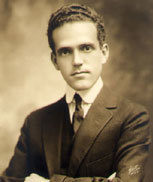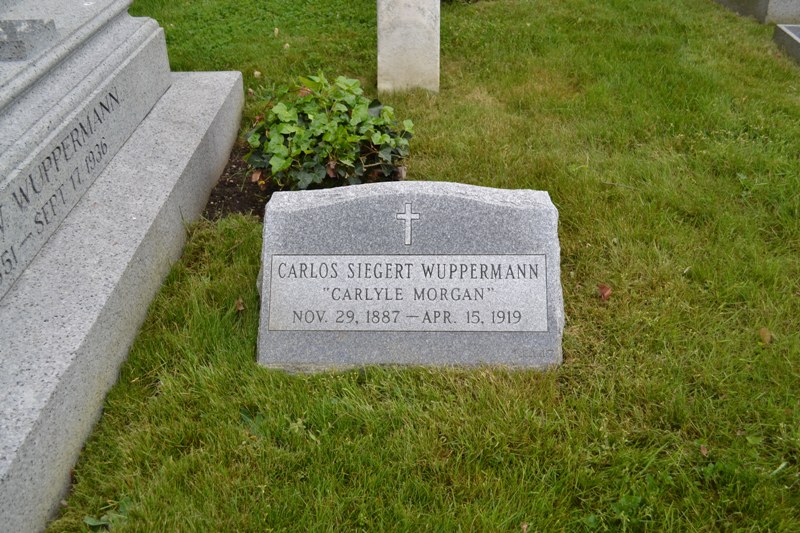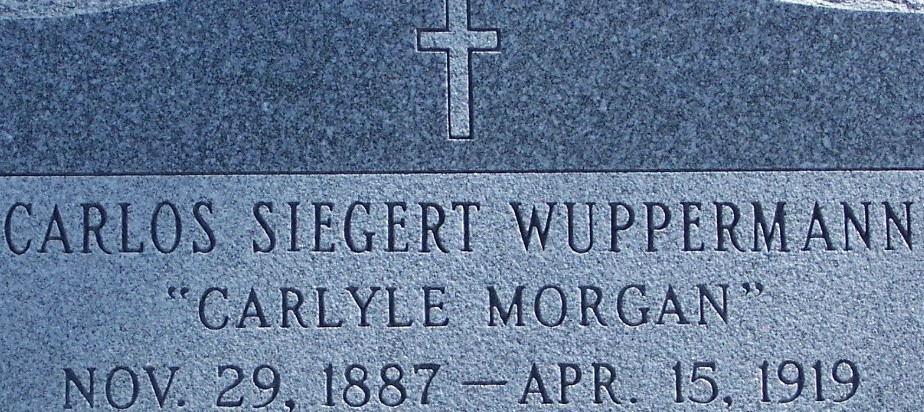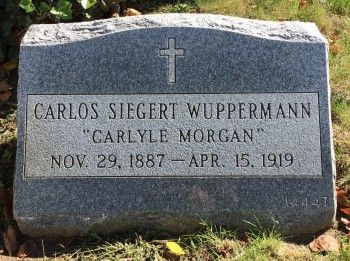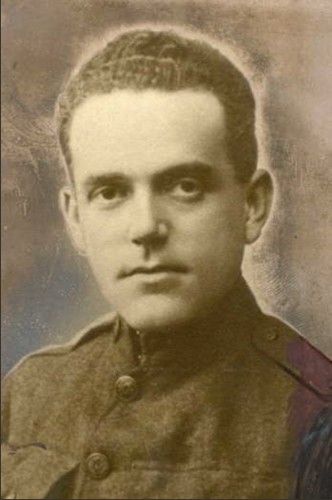Carlos acquired his early education at Trinity School in New York City where he studied from 1896 to 1903 in which year he entered Columbia University. After studying three years at Columbia, he went to Europe to supplement his college studies by attending lectures at the University of Leipzig in Germany. After a year in Germany, he returned to Columbia resuming his studies and graduating with an A. B. degree in the spring of 1907. He was a member of Phi Gamma Delta fraternity, Debating Society, College Freshman Chess team in college and later a member of the Tower Ridge Yacht Club, Hastings Tennis Team and president of the Peithologian Literary Society.
Stimulated to literary endeavors by his college work of the Columbia Monthly, Carlos followed the call to authorship. He was the author of "The Deeper Faith", a book of essays. In 1912 he authored a book of poems, "Quiet Places" attesting to the scope of his powers. He wrote with marked versatility for various magazines and as a playwright he began at once to author very definite promise. In fact, at the time of his death, several of his plays were under consideration by prominent producers. In the winter of 1917, one of his plays, "Laughing Harry", was given at the annual Actors Fund Benefit in Chicago and Boston and it was meeting with gratifying success in Vaudeville when the United States entered World War I. The play then, for political reasons, was withdrawn.
The gift for drama showed its self also in Carlos as an actor. He appeared in 1915 at the Cort Theater in "Under Cover" where he succeeded his brother Raphael (Ralph Morgan) in a part. The role was followed by others in various plays, and Carlos traveled as far as the Pacific Coast with Walker Whiteside, acting in "The Typhoon" using his stage name " Carlos Morgan". Carlos' brother Francis appeared in his Broadway four act play "The Triumph of X".
In June 1917 Carlos set aside his promising career to serve his country. He enlisted in Base Hospital Number 1, Bellevue Unit, for overseas service. He went to France February 1918 where he was first assigned hospital service. His superiors soon recognized his special gifts for other services as an accomplished linguist, speaking with ease four languages. The Intelligence Department of the American Expeditionary Forces needed just such a talent. Although the new assignment was extremely dangerous at times, Carlos possessed the necessary coolness and courage for it and eagerly accepted the assignment. Following a short period of duty at Paris, St. Nazaire, and Clermont in French territory, he was assigned to the Army of Occupation at Trier, Germany where he, in the line of duty died. His death was originally said to have been a suicide. His mother sent private investigators to Trier to learn the details. The investigators learned the truth that he was shot by an Intelligence Service officer partner.
A commissioned officer wrote:
Carlos was likable, well educated, cultured, and studious; his personality was preeminent in
An organization largely composed of college men. We were proud that Sergeant Wupperman
Went to France as a member of our organization. We were proud of him when he accepted
The call of greater service in the dangerous work of the Intelligence Department, and we were
Proud of him in his death.
Mrs. Walker Whiteside, whose husband was mentioned above, had in her mind Carlos' book of poems, "Quiet Places", when she composed and read at the Grace Church, Hastings-on-Hudson, New York memorial services for Carlos the following:
A friend "Gone West" the hour of day unrung,
A grave boy sleeps, whose heralds are unsung,
So find his work in silent ways,
It swept beyond mere human praise.
The glory of the open fight,
Or deeds of mercy, his by right,
Were cast aside when duty's voice
A summons served and asked his choice.
No weakening thought to bend his nerve,
No thrill to pierce his iron reserve,
No hope of joy beyond the goal,
No unbound ecstasy of soul.
By higher hands his pathway traced;
His work and honor subtly placed.
He questioned not the wisdom shown,
But carried on, unseen, unknown.
His missions done; the lights are low,
the curtain falls on friend and foe.
The end shall justify the means
and make him live beyond his dreams.
A poet first - the soldier came,
A challenge to the world aflame!
And now with peace and all the graces
He helped to gain
we leave him where he would have lain, -
In "Quiet Places".
∼(Columbia 1907) - sergeant, Military Intelligence Section, American Army Expeditionary Forces; died in line of duty at Treves, Germany 4-15-1919.
Carlos acquired his early education at Trinity School in New York City where he studied from 1896 to 1903 in which year he entered Columbia University. After studying three years at Columbia, he went to Europe to supplement his college studies by attending lectures at the University of Leipzig in Germany. After a year in Germany, he returned to Columbia resuming his studies and graduating with an A. B. degree in the spring of 1907. He was a member of Phi Gamma Delta fraternity, Debating Society, College Freshman Chess team in college and later a member of the Tower Ridge Yacht Club, Hastings Tennis Team and president of the Peithologian Literary Society.
Stimulated to literary endeavors by his college work of the Columbia Monthly, Carlos followed the call to authorship. He was the author of "The Deeper Faith", a book of essays. In 1912 he authored a book of poems, "Quiet Places" attesting to the scope of his powers. He wrote with marked versatility for various magazines and as a playwright he began at once to author very definite promise. In fact, at the time of his death, several of his plays were under consideration by prominent producers. In the winter of 1917, one of his plays, "Laughing Harry", was given at the annual Actors Fund Benefit in Chicago and Boston and it was meeting with gratifying success in Vaudeville when the United States entered World War I. The play then, for political reasons, was withdrawn.
The gift for drama showed its self also in Carlos as an actor. He appeared in 1915 at the Cort Theater in "Under Cover" where he succeeded his brother Raphael (Ralph Morgan) in a part. The role was followed by others in various plays, and Carlos traveled as far as the Pacific Coast with Walker Whiteside, acting in "The Typhoon" using his stage name " Carlos Morgan". Carlos' brother Francis appeared in his Broadway four act play "The Triumph of X".
In June 1917 Carlos set aside his promising career to serve his country. He enlisted in Base Hospital Number 1, Bellevue Unit, for overseas service. He went to France February 1918 where he was first assigned hospital service. His superiors soon recognized his special gifts for other services as an accomplished linguist, speaking with ease four languages. The Intelligence Department of the American Expeditionary Forces needed just such a talent. Although the new assignment was extremely dangerous at times, Carlos possessed the necessary coolness and courage for it and eagerly accepted the assignment. Following a short period of duty at Paris, St. Nazaire, and Clermont in French territory, he was assigned to the Army of Occupation at Trier, Germany where he, in the line of duty died. His death was originally said to have been a suicide. His mother sent private investigators to Trier to learn the details. The investigators learned the truth that he was shot by an Intelligence Service officer partner.
A commissioned officer wrote:
Carlos was likable, well educated, cultured, and studious; his personality was preeminent in
An organization largely composed of college men. We were proud that Sergeant Wupperman
Went to France as a member of our organization. We were proud of him when he accepted
The call of greater service in the dangerous work of the Intelligence Department, and we were
Proud of him in his death.
Mrs. Walker Whiteside, whose husband was mentioned above, had in her mind Carlos' book of poems, "Quiet Places", when she composed and read at the Grace Church, Hastings-on-Hudson, New York memorial services for Carlos the following:
A friend "Gone West" the hour of day unrung,
A grave boy sleeps, whose heralds are unsung,
So find his work in silent ways,
It swept beyond mere human praise.
The glory of the open fight,
Or deeds of mercy, his by right,
Were cast aside when duty's voice
A summons served and asked his choice.
No weakening thought to bend his nerve,
No thrill to pierce his iron reserve,
No hope of joy beyond the goal,
No unbound ecstasy of soul.
By higher hands his pathway traced;
His work and honor subtly placed.
He questioned not the wisdom shown,
But carried on, unseen, unknown.
His missions done; the lights are low,
the curtain falls on friend and foe.
The end shall justify the means
and make him live beyond his dreams.
A poet first - the soldier came,
A challenge to the world aflame!
And now with peace and all the graces
He helped to gain
we leave him where he would have lain, -
In "Quiet Places".
∼(Columbia 1907) - sergeant, Military Intelligence Section, American Army Expeditionary Forces; died in line of duty at Treves, Germany 4-15-1919.
